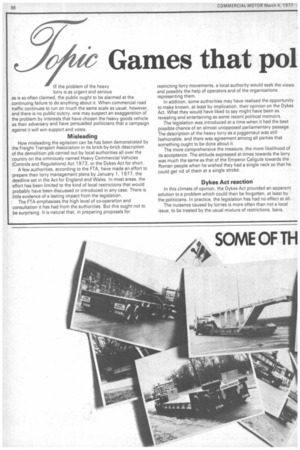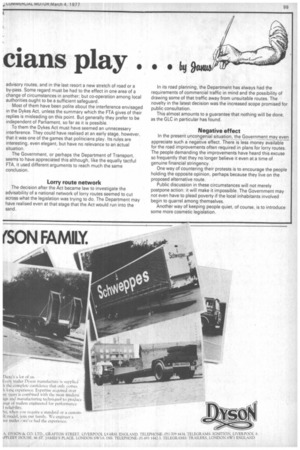Games that pol
Page 104

Page 105

If you've noticed an error in this article please click here to report it so we can fix it.
clans play . . . bq gam
IF the problem of the heavy lorry is as urgent and serious as is so often claimed, the public ought to be alarmed at the continuing failure to do anything about it. When commercial road traffic continues to run on much the same scale as usual, however, and there is no public outcry, one may suspect an exaggeration of the problem by interests that have chosen the heavy goods vehicle as their adversary and have persuaded politicians that a campaign against it will win support and votes.
Misleading
How misleading the agitation can be has been demonstrated by the Freight Transport Association in its brick-by-brick description of the demolition job carried out by local authorities all over the country on the ominously named Heavy Commercial Vehicles {Controls and Regulations) Act 1973, or the Dykes Act for short.
A few authorities, according to the FTA, have made an effort to prepare their lorry management plans by January 1, 1977, the deadline set in the Act for England and Wales. In most areas, the effort has been limited to the kind of local restrictions that would probably have been discussed or introduced in any case. There is little evidence of a lasting impact from the legislation.
The FTA emphasises the high level of co-operation and consultation it has had from the authorities. But this ought not to be surprising. It is natural that, in preparing proposals for restricting lorry movements, a local authority would seek the views and possibly the help of operators and of the organisations representing them.
In addition, some authorities may have realised the opportunity to make known, at least by implication, their opinion on the Dykes Act. What they would have liked to say might have been as revealing and entertaining as some recent political memoirs.
The legislation was introduced at a time when it had the best possible chance of an almost unopposed parliamentary passage. The description of the heavy lorry as a juggernaut was still fashionable, and there was agreement among all parties that something ought to be done about it.
The more comprehensive the measure, the more likelihood of its acceptance. The attitude expressed at times towards the lorry was much the same as that of the Emperor Caligula towards the Roman people when he wished they had a single neck so that he could get rid of them at a single stroke.
Dykes Act reaction
In this climate of opinion, the Dykes Act provided an apparent solution to a problem which could then be forgotten, at least by the politicians. In practice, the legislation has had no effect at all.
The nuisance caused by lorries is more often than not a local issue, to be treated by the usual mixture of restrictions. bans, advisory routes, and in the last resort a new stretch of road or a by-pass. Some regard must be had to the effect in one area of a change of circumstances in another; but co-operation among local authorities ought to be a sufficient safeguard.
Most of them have been polite about the interference envisaged in the Dykes Act, unless the summary which the FTA gives of their replies is misleading on this point. But generally they prefer to be independent of Parliament, so far as it is possible.
To them the Dykes Act must have seemed an unnecessary interference. They could have realised at an early stage, however, that it was one of the games that politicians play. Its rules are interesting, even elegant, but have no relevance to an actual situation.
The Government, or perhaps the Department of Transport, seems to have appreciated this although, like the equally tactful FTA, it used different arguments to reach much the same conclusion.
Lorry route network
The decision after the Act became law to investigate the advisability of a national network of lorry routes seemed to cut across what the legislation was trying to do. The Department may have realised even at that stage that the Act would run into the sand. In its road planning, the Department has always had the requirements of commercial traffic in mind and the possibility of drawing some of that traffic away from unsuitable routes. The novelty in the latest decision was the increased scope promised for public consultation.
This almost amounts to a guarantee that nothing will be done, as the GLC in particular has found.
Negative effect In the present uncong_enial situation, the Government may even appreciate such a negative effect. There is less money available for the road improvements often required in plans for lorry routes. The people demanding the improvements have heard this excuse so frequently that they no longer believe it even at a time of genuine financial stringency.
One way of countering their protests is to encourage the people holding the opposite opinion, perhaps because they live on the proposed alternative route.
Public discussion in these circumstances will not merely postpone action: it will make it impossible. The Government may not even have to plead poverty if the local inhabitants involved begin to quarrel among themselves.
Another way of keeping people quiet, of course, is to introduce some more cosmetic legislation.


























































































































































